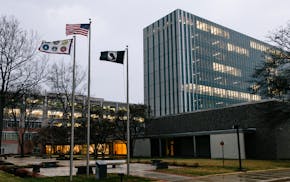MANKATO – The claw of the excavator tore into the century-old building's brick façade with surprising ease, sending a cascade of dust and debris tumbling through the chilly winter air.
Across the street, local developer Jon Kietzer watched the demolition from the warmth of the cab in his electric pickup truck.
For nearly a decade, Kietzer had tried to develop this block of downtown Mankato, in a journey with many dead ends and ever-rising costs. His quest may soon reach fruition as part of a $93 million, two-hotel project that Kietzer, a team-up of other developers and the city hope will turbocharge Mankato's downtown by attracting more conventions.
"It's been a long time coming," Kietzer said as he watched the bricks fall.
The project is one of the largest-ever investments in this college town 80 miles south of Minneapolis. The plan calls for demolishing the Landmark Center and another vacant building and replacing them with two hotels: a 10-story AC by Marriott and a four-story Element by Westin. The complex would have 282 guest rooms, a rooftop restaurant, a 168-stall underground parking garage and a connection via skyway to the city's civic center.
Developers acknowledge that the $93 million price tag is steep and would not have been possible without significant public backing. This includes an $11 million package of local and state subsidies, including a $1.1 million redevelopment grant from the Minnesota Department of Employment and Economic Development and $9.94 million in tax increment financing from the Mankato City Council.
The project, expected to finish in 2026, will snarl traffic downtown, and developers estimate they will have to pay the city some $300,000 in obstruction fees.
But Mankato's gamble is that building more hotels can attract corporate conventions. The city is missing out on conventions due to not having enough hotels downtown, said Tony Frentz, another developer on the project and co-founder of Mankato-based Neubau Holdings.
More conventions would then boost the downtown's economy and provide good memories for visitors, said Andy Wilke, executive vice president for Greater Mankato Growth.
"People want retailers and communities to provide fun experiences … and a project like this hotel is going to create those experiences," Wilke said.
The project is expected to create 111 jobs, DEED said when announcing a $323,887 grant this week to scrub the site of petroleum and other contaminants.
For Kietzer, the demolition of the Landmark Center is bittersweet. "It's kind of a bummer," he said as he watched the building fall. He bought the building in 2014 and had intended to save it. The building, which at one point was a car dealership, was built in about 1916, he said.
One of the original plans was to renovate the Landmark Center and turn it into apartments and a distillery. Mankato approved financing for the project, only for construction costs to spiral out of control after the pandemic. The next plan was to turn the building into a boutique hotel, Kietzer said. But the cost of renovations, particularly the heating and plumbing system, kept increasing — and then the vacant building began to fall apart, he said.
In February 2023, the Landmark Center's roof partially collapsed after drains froze. And in September, a section of the other building, the former City Center Hotel, collapsed when a rusted beam broke loose. Not doing the project would mean the two buildings would continue to degrade, City Manager Susan Arntz said at a council meeting in October.
Kietzer said he abandoned hopes of renovating the Landmark Center after the roof collapsed, and then he allied with a group of local investors. Bryan Sowers, a former banker, said he and Kietzer are part of a larger-than-usual collection of investors in the project that includes Frentz, Chad Surprenant of ISG, the Mankato-based Tailwind Group and Willmar-based TPI Hospitality.
Kietzer said the developers doubt the project will be that profitable, but it will be worth it for its impact on Mankato's downtown.
"We'd be willing to give up some return on investment in order to see this huge of a project done down here — that's going to be a catalyst for more projects," Kietzer said.

Brooks: Hard lives led to hard-won diplomas for these Minnesota high schoolers

Trump races to fix a big mistake: DOGE fired too many people

St. Paul sees 'unprecedented' day care closures, sending families scrambling

One man dead in shooting Friday outside Northtown Mall in Blaine

